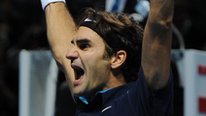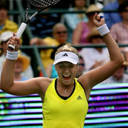Everyday winning mentality!
If winning is our final goal as tennis players, it is the working and reworking of the individual victories that decides how fast, and in what way, a player establishes a successful formula that can repeat in the future.

Winning one match
The good news for all tennis players out there is that winning one match sets you up for a while. In other words, after a victory, you can pat yourself on the back, and simply repeat what you did in that match. It sounds pretty easy, and it is easy.
The human brain and psyche is well-designed for repetitive activities. Repetition that brings success is very easily remembered, so I have no hesitation in letting players enjoy their win, and talking about it, going over the great moments and great shots. It could be that the significant 'first' wins remain in the player's psyche for a lifetime.
The first problem is that at some point in the near future you are going to lose again.
One of my favourite tennis quotes was from Ivan Lendl. He said that to become a winner you had to learn how to lose. He was clarifying a central point to tennis, that it is impossible to win all the time, even when you are at the top of the game.
Most players will be losing frequently. A player ranked 80 in the world, someone, let's not forget who is making a good living from the game, is losing twenty-five matches, and winning twenty-five matches a year. Are these losses affecting him? Not a lot. Is he learning from these losses? Chiefly one thing - don't play that way again!
Whether you get much detail on HOW and WHY you lost is debatable. Personally, if I lose I simply say to myself, do it differently next time. Sometimes that "differently" requires radical, long term changes, like technical, or fitness ones. However most changes for a player who knows how to hit a ball are strategic ones. I'll give you an example.
One of my most satisfying victories came in the second half of this year. I play a high level of veterans' tennis, and I had two away matches to play on Quick, or Tarmac to those not accustomed to the French terms. I don't play much on Quick, and, in the past, I've got one or two Quick matches completely wrong, and really struggled.
This year, with a little trepidation I must confess, I lost the first one. I was hitting the ball well, putting my opponent under pressure, but I was hitting too flat, and taking too many risks off 50/50 balls. My opponent just had to keep pushing the ball back into play and he knew I'd beat myself! That is exactly what happened. There is nothing more infuriating than a match where you beat yourself. Your opponent doesn't have to do much, just wait for you to make your own errors. I knew, as I was hitting my aggressive shots, that it was the wrong way to be playing, but during the match I found it hellishly difficult to adapt my hitting.

Filthy match
I had a couple of weeks' pause before the second big game came along. This was a guy who had beaten me on my surface at the beginning of the year, one of my slightly infuriating results, but in fact that match was a fine one. It was two sets of the highest standard, and I lost a couple of the big points. It really was as simple as that.
Now I had to play him on his home soil, watched by his own team colleagues and his daughter who dutifully clapped all his good plays for three hours. He was coming into the game with a lot of confidence after beating me a few months earlier. I went 5-1 down quickly, but in fact I was working well on my hitting, and it was going OK. I lost the first set 6-4, but I was well in the match.
During the second set the rallies just got longer and longer on a very hot day. This should have been my anti-tennis, but every now and then I drew a poor error from my opponent's racket. When your opponent makes a poor error, you know you are playing along the right lines. I finished the second set strongly.
He resisted well to about 2-2 in the third, then I hit a purple patch, a mixture of wonderful cross-court rallying and big shots, and patient clever seving, to go 5-2 up. On match point I played a great backhand return in the ad court. He sent it deep into my forehand corner. I ran and ran and threw up an enormous high ball that would have landed around his service line, not a difficult ball for him. He missed his smash, and I whooped with joy.
He was so furious not only with the loss, but the fact the way he lost to someone he'd recently beaten, that he nearly refused to shake my hand after the match. He didn't talk to me in the bar afterwards, he couldn't even look me in the eye. I heard him talking to his team colleagues, and all he could do was make excuses about the sun and heat. So I sat on my own for a while. Then his sixteen year old daughter came up to me, simply smiled at me and said "well played!" Who do you think I respect more, his daughter, or my opponent?

Parental support
So in two weeks I managed to play a very very different match strategically, on the same surface, with a similar opponent. That isn't easy, but, most of the time, a player must simply, after a defeat, NOT do it the same way again. Big changes, small changes, whatever. But do it differently. It may fail again, but that mindset must be there. Otherwise you'll be beaten by the same man twenty times in a row. That's not nice.
There's a second problem with winning. It can give you too much a feeling of indestructibility. Watch out!
Much as I enjoy talking through victories and reinforcing the positive images with my players, it is not only after a defeat that your game MUST move on. After a victory too, your game must move on. That is why the Djokovic year in 2011 was so commendable. He didn't just beat one player once. He drove himself beyond a reasonable human objective, and just got better and better in giant bounds. In every match we saw a new Djokovic.
We can all do this. After a win, build on it.
It's easy to develop confidence in your own game after a win, but now look at the competition out there. Your next opponent is thinking, " wow, he's been having good results lately! But I'm going to be the one to stop him in his tracks." Every good tennis player will come into a match thinking they will win, and the very good players have wonderful preparation and strategies to achieve that.
When you are winning, enjoy every second of it, but move rapidly onto the next step, BEFORE your next match.

Tennis scholarship
Apply now!For junior and senior circuits.
Auf deutsch, Turnieranmeldungen
En francais, tournée inscriptions


